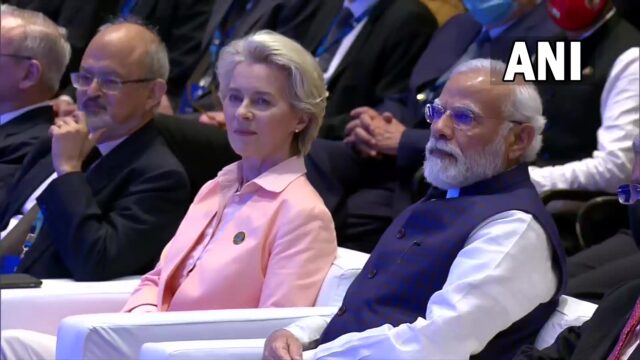The President of the European Commission Ursula von der Leyen arrived in New Delhi for a two-day visit. The EU head arrived on 24 April; one of the main purposes of her visit is to celebrate 60 years of friendship between India and the European Union.
In her current role, this would be von der Leyen’s first visit to India. In an effort to enhance the strategic relationship, dialogues covered energy and digital transition, connectivity, security and defence, Indo-Pacific cooperation, and climate change and biodiversity loss.
The visiting leader met Prime Minister Narendra Modi and President Ram Nath Kovind during her stay. The Commission President also attended and spoke at the Raisina Dialogue inaugural ceremony in New Delhi.
The EU head said that “Both (India and EU) our economies thrive in a world of common rules and fair competition.”
Speaking about India’s democracy, the leader added, “Every five years when Indians cast their vote in parliamentary elections, the world watches with admiration as the world’s largest democracy charts its future path because the outcome of decisions made by 1.3 billion people resonates around the globe.”
On aligning interests, the EU chief said “…And we share the same interests in safe trading routes, seamless supply chains and in a free and open Indo-Pacific.”
During her address at the Dialogue forum, she also spoke about the Ukraine-Russia crisis.
With PM Modi, the visiting EC leader discussed events in Ukraine, they also decided to set up the EU-India Trade and Technology Council, a strategic coordination mechanism to tackle challenges in trade, trusted technology, and security. This will be the first arrangement for India and the second for the EU. The EU has similar arrangements only with the US.
Other than the EU chief, the foreign ministers of other European countries, namely, Norway, Lithuania, Luxembourg, Netherlands, Poland, Portugal, and Slovenia — were also visiting India. The foreign ministers also participated in the Dialogue forum.
Summarizing the highlights of the trip, a spokesperson of India’s Foreign Ministry said the two sides agreed to “deepen cooperation in areas of trade, climate, digital technology, and people-to-people ties.”









